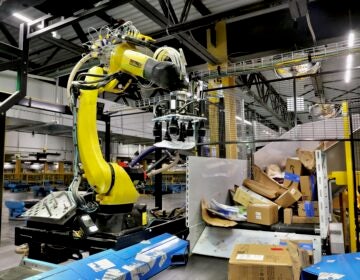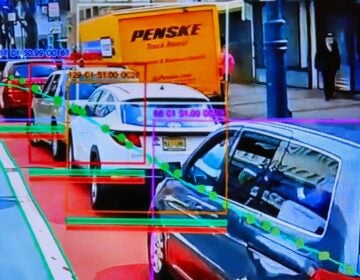Philly researchers are using AI robots to better support aging adults with autism
Researchers at Saint Joseph’s University are collaborating with Bancroft, a New Jersey nonprofit, to pilot AI technology with people in assisted living communities.
From Philly and the Pa. suburbs to South Jersey and Delaware, what would you like WHYY News to cover? Let us know!
At the Haub Innovation Center at Saint Joseph’s University, a 4-foot-tall figure stood at the front of the room. It looked a little bit like an Oscar statue, but made from white materials, with arms akimbo, lifelike hands and an oblong-shaped head sitting on a skinny neck.
The head had large, dark eyes, a tiny, upturned nose and a little mouth and swiveled in the direction of any nearby speaker.
Immediately, a woman in her 60s named Christina walked over and hugged the figure.
“Hi Pepper. Remember me?” she asked.
Pepper is an artificially intelligent social robot programmed by Saint Joseph’s researchers to interact with people like Christina, who is autistic.
Christina lives at nonprofit organization Bancroft’s Judith B. Flicker Residences, an assisted living complex in Voorhees, New Jersey for seniors with intellectual and developmental disabilities. WHYY is only using residents’ first names to protect their privacy.
A group of five residents, all in their 60s, 70s and 80s, soon gathered in front of Pepper to hear what the robot had in store for them.

“I’m so glad you came back to see me. I have some fun activities planned for you today. Are you ready to start?” Pepper asked the group, to which everyone responded enthusiastically.
Under Pepper’s guidance, the residents played games like “Name That Song” and “Name That Sound.” Pepper also played music and an impromptu dance party broke out to the tune of “Mr. Sandman.”
The technology is being used in a long-term pilot project between Saint Joseph’s and Bancroft to figure how AI robots could be used to help support aging adults with autism, who may need more attention and cognitive stimulation as they get older.
It’s also an opportunity to learn more about the physical health and cognitive changes in aging autistic adults, experts said, as research on this population remains limited.
“What does healthy aging look like for this group?” said Karen Lindgren, Bancroft chief clinical officer. “We know cognitively they’re very different. Social connection might look very different. So, how do we support that and do that here?”
Research gaps in tracking aging autistic adults
People with autism spectrum disorder sometimes have problems with social interaction and communication, repetitive behaviors and hypersensitivity to stimuli.
Many people on the spectrum live independently average lives. But others with more severe or profound autism often need daily assistance or 24/7 care.
This can be especially true as adults get older and need new long-term residential support as their parents or lifelong caregivers become elderly themselves, said Victoria Sweeney, senior director of adult residential services at Bancroft.
“As people out there are aging who have intellectual disabilities and they’ve lived at home all those years, and well cared for and loved, the fear is there aren’t many options for them,” she said.
The Flicker residences are staffed by senior care providers as well as specialists who are trained to meet the unique needs of patients with intellectual and developmental disabilities.

For example, Lindgren said some residents don’t use spoken language and use other forms of communication, like gestures, to express their feelings, opinions and choices.
But verbal skills and a willingness to participate in testing are often required to identify cognitive changes and early warning signs of dementia. No such testing model exists for people with profound autism and other developmental disabilities.
Giacomo Vivanti, an associate professor at the A.J. Drexel Autism Institute, said this is really uncharted territory.
“For one example, it has been known for a long time that if you have a diagnosis of Down syndrome, that will increase your risk for dementia. That comes with the opportunity to plan health care accordingly,” he said. “But we had no information on whether this is the case with someone who is on the autism spectrum.”
That’s where unique and advanced technologies may play a role, especially AI robots like Pepper who can potentially track the behaviors of individual residents over long periods of time, Director Diana Robins said.
“Let’s say we’re seeing increased agitation or a decrease in some of the daily skills that somebody had been doing independently for some time and suddenly they’re doing fewer of them,” she said. “Being able to evaluate if that’s a steady decline or something that might go up and down is going to be really critical.”
AI robot companionship and Pepper’s future potential
Saint Joseph’s University Haub Innovation Center Director Marcello Balduccini and psychology professor Sara Girotto first partnered with Bancroft in 2023 on the AI robot pilot project.
They programmed Pepper with activities and responses that are playful and engaging, but still geared toward adults and adult problem solving. One activity proposes a pretend trip to Dunkin’ Donuts.
“What do you do first: pay for your order or decide what to eat and drink?” Pepper asked.
“Decide to eat!” several residents responded.
Players have to get up and select their answers on a smart tablet attached to the front of Pepper. Bancroft Therapeutic Activities Coordinator Linda Miller said the activities with the robot get residents physically moving more than they typically would.
“It’s engaging,” she said. “It’s also distracting. For example, pain. They’re probably not thinking about the pain. It’s like, ‘Oh, my sound or my song is on, I’m going to do that.’”

Balduccini said they hope to add more sophisticated and advanced programming one day, but what they’ve achieved so far is a good start.
“The priority is to make the sessions enjoyable to them,” he said. “Then if we can do better face recognition, speech recognition, that would be nice.”
Lindgren says one of the greatest benefits of Pepper has been the companionship the robot provides to residents.
“It’s just a really unexpected but lovely result for us, the degree to which there is joy,” she said.
Long term, Lindgren sees Pepper as a supplement to what humans can provide aging adults with autism, not a replacement.
Bancroft and its residents like Flicker in New Jersey will soon get their own AI robot that will begin to regularly interact with residents where they are living and aging.


Get daily updates from WHYY News!
WHYY is your source for fact-based, in-depth journalism and information. As a nonprofit organization, we rely on financial support from readers like you. Please give today.












